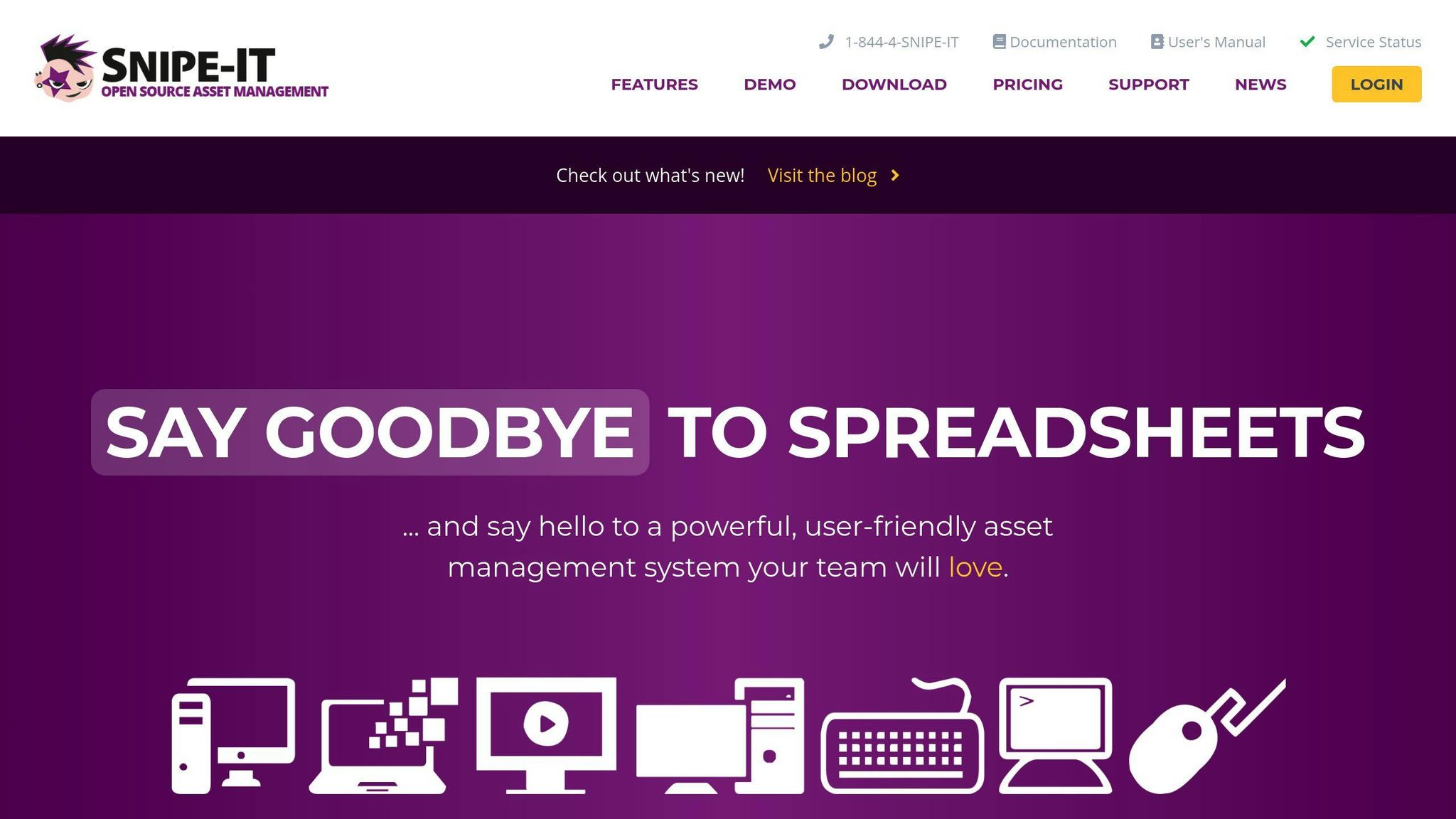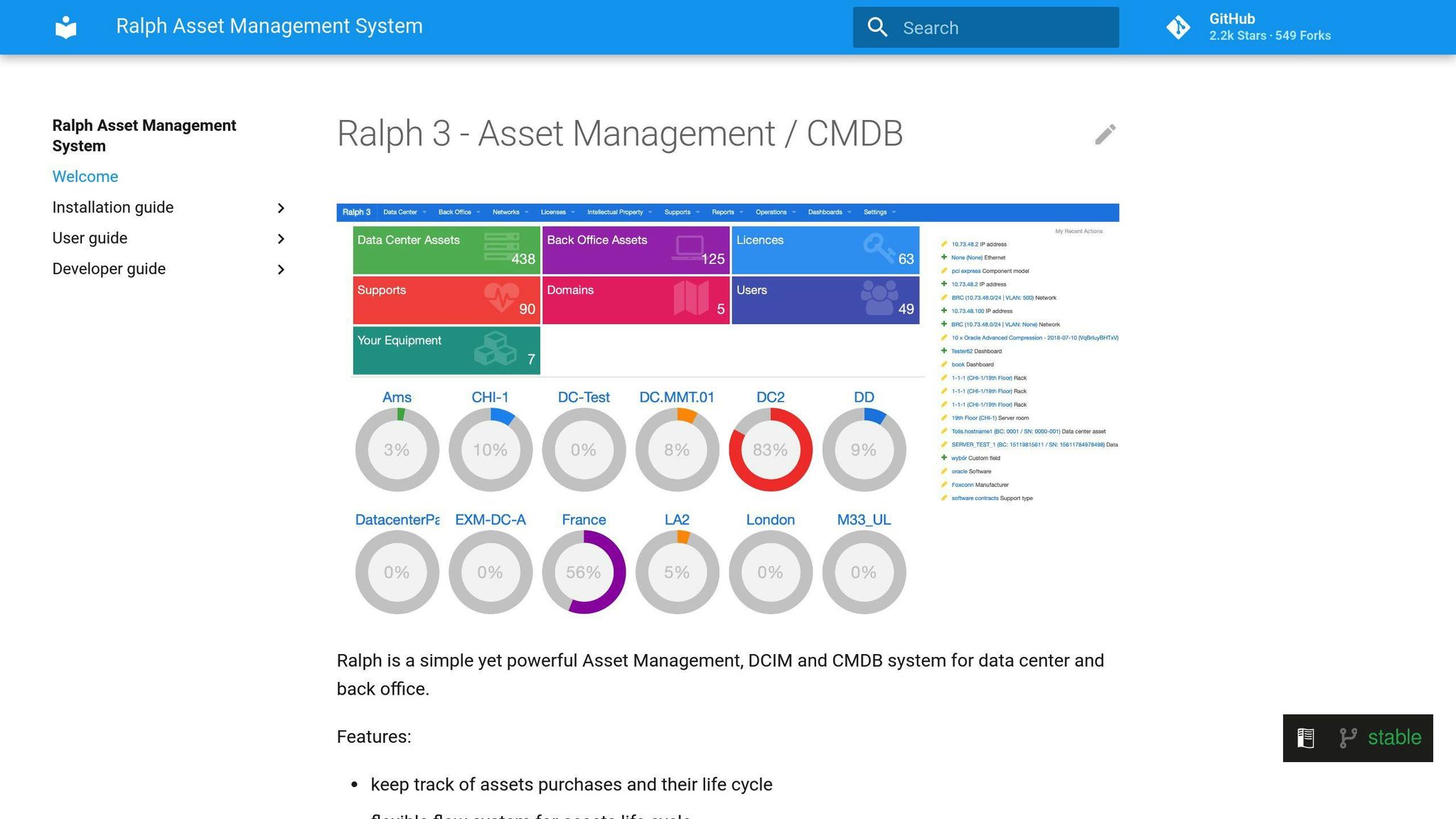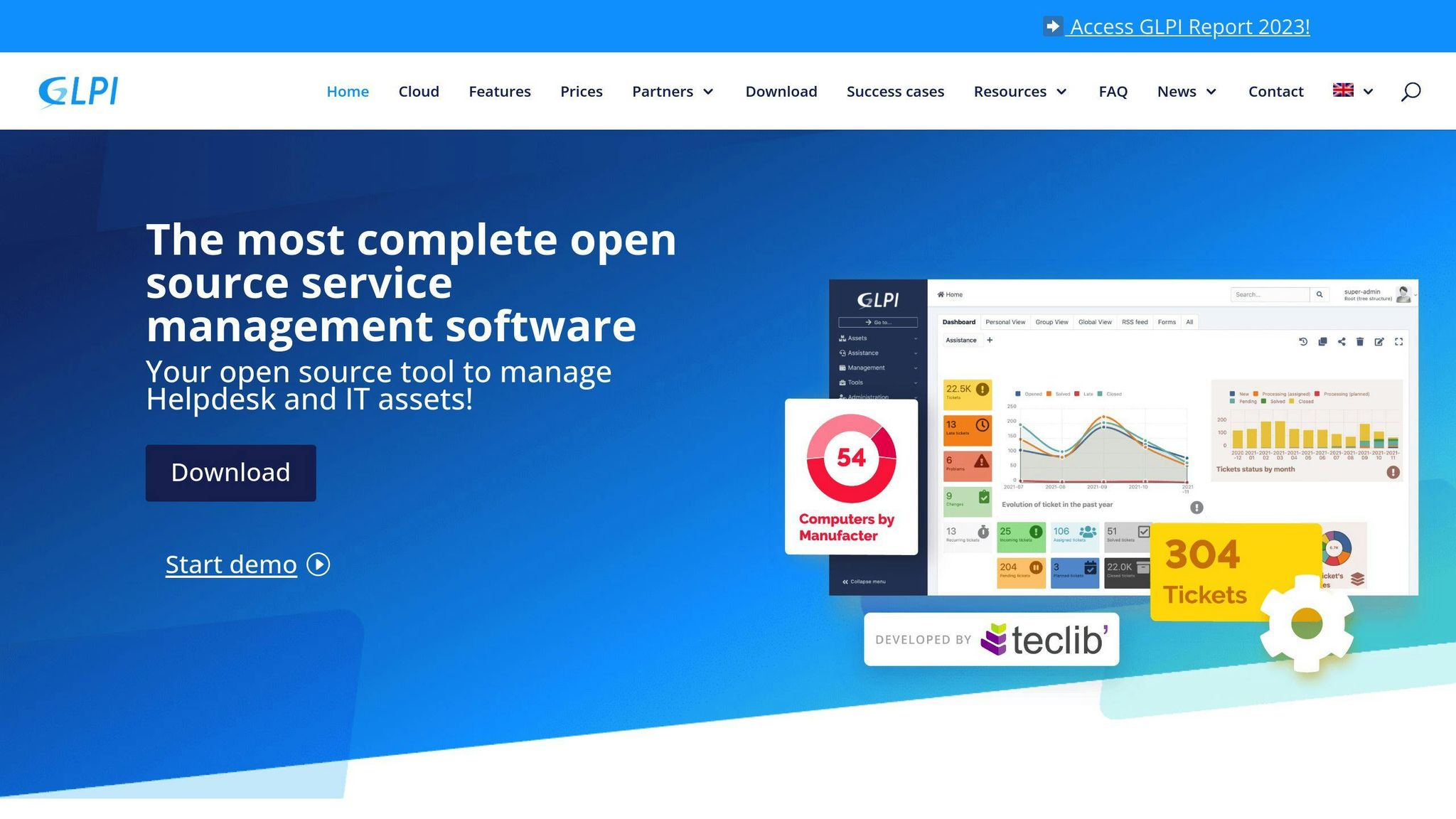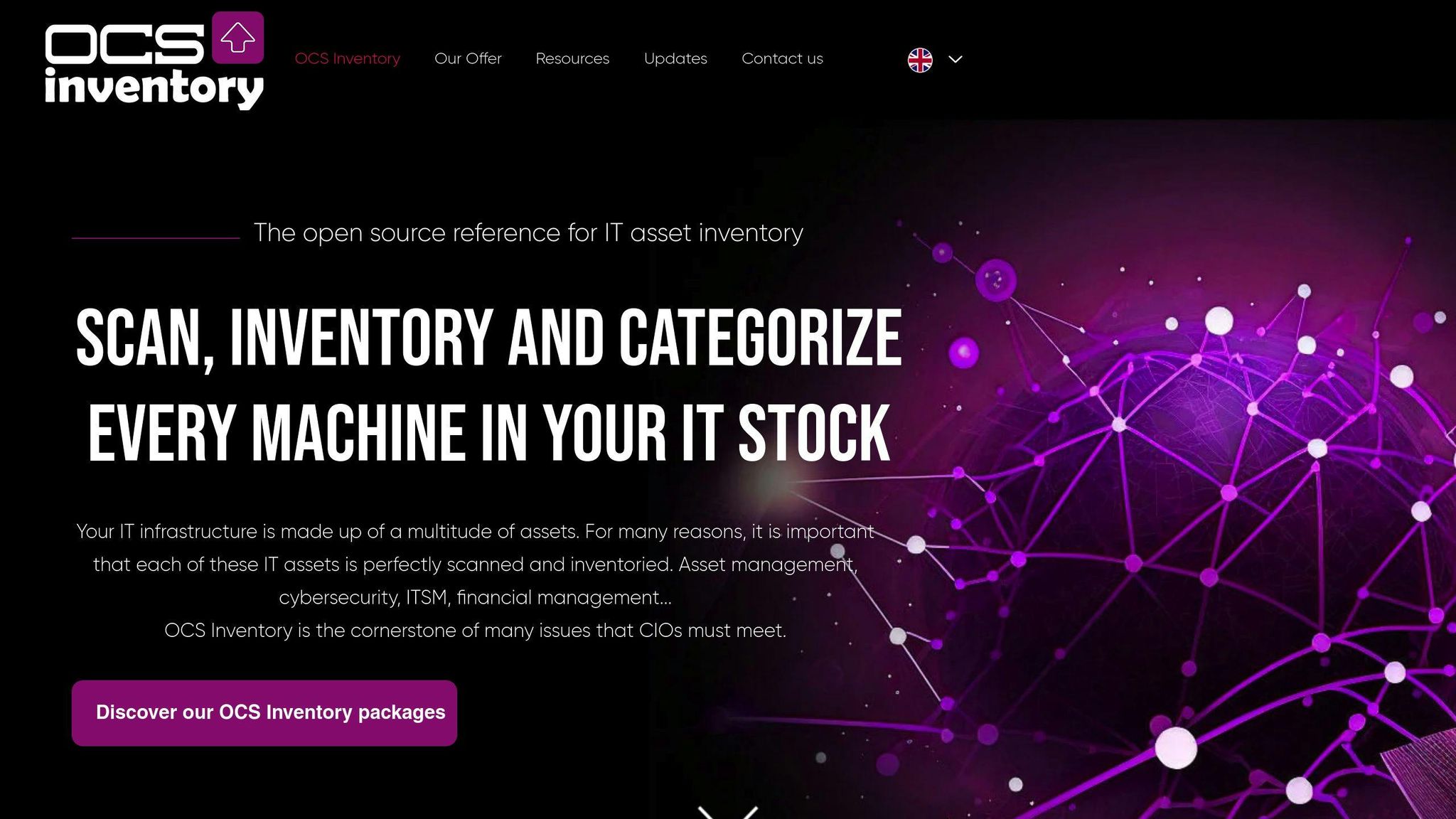Need a free way to track your IT assets? Here's a no-nonsense guide to the top open source tools that help you manage everything from computers to software licenses.
| Tool | What It's Best For | Key Feature |
|---|---|---|
| Snipe-IT | Small businesses | Easy hardware tracking |
| Ralph | Data centers | Server/rack management |
| GLPI | Big companies | Built-in help desk |
| OCS Inventory | IT departments | Auto-finds network devices |
Quick facts about these tools:
- Zero cost - they're all free and open source
- You can change the code to fit your needs
- Each one focuses on different IT tasks
- All work through web browsers
- Support common features like asset tracking and reporting
What you'll learn in this guide:
- How these 4 tools stack up against each other
- Must-have features for asset management
- How to pick the right tool for your needs
- Setup and maintenance basics
- Common problems and fixes
| Core Feature | What You Get |
|---|---|
| Asset Tracking | Track hardware, software, and licenses |
| Reporting | Export data and build custom reports |
| Security | User permissions and data backups |
| Integration | APIs and directory service support |
Skip the fancy features you won't use. Pick the tool that matches your actual needs - not the one with the longest feature list.
Related video from YouTube
Comparing Open Source Asset Management Software
Here's how 4 popular open source asset management tools compare:
| Tool | Best For | Main Features | License |
|---|---|---|---|
| Snipe-IT | Small-medium businesses | Asset tracking, license management, maintenance logs | AGPL v3 |
| Ralph | Data centers | DCIM features, data center visualization, rack management | Apache 2.0 |
| GLPI | Large organizations | Help desk, inventory, ticketing system | GPL v2 |
| OCS Inventory | Network scanning | Auto-discovery, software inventory, network scanning | GPL v2 |
Snipe-IT

Snipe-IT makes asset tracking simple. Built with PHP/Laravel, it gives you:
- Equipment check-in/check-out
- QR code and barcode scanning
- Custom asset fields
- Maintenance tracking
- API access
Ralph

Ralph shines at data center management. You get:
- Data center monitoring
- IP address tracking
- Purchase management
- Multi-location support
- Built-in reports
GLPI

GLPI combines everything you need for IT management:
| Feature | What You Get |
|---|---|
| Asset Management | Track computers, phones, software |
| Help Desk | Handle support tickets |
| Inventory | Auto-update asset records |
| Reports | Build custom reports |
OCS Inventory

OCS Inventory spots everything on your network:
- Finds network devices automatically
- Keeps tabs on software
- Spots hardware changes
- Creates network maps
- Runs on Windows, Linux, macOS
Pick your tool based on:
- How big your team is
- What assets you manage
- Your hosting budget
- Your tech know-how
Key Criteria for Choosing Asset Management Software
Here's what you need to look for in asset management software:
Core Features You Can't Skip
| Feature | What You Need |
|---|---|
| Asset Tracking | - Scan barcodes and QR codes - Track who has what - Monitor asset lifecycle - Add custom asset fields |
| Reporting | - Export data easily - Build your own reports - See asset status at a glance - Track all changes |
| Security | - Control who sees what - Monitor user actions - Keep data safe with encryption - Back up your data |
| Integration | - Connect through API - Work with your directory service - Use single sign-on - Get email updates |
Testing the Software
Before you buy, test these things:
- How fast can you jump between screens?
- Does the search actually find what you need?
- Can you update multiple items at once?
- Does it work well on your phone?
The software should come with:
- Step-by-step setup instructions
- Database setup help
- Real examples you can follow
- Solutions for common problems
Making It Work for You
| What to Change | How to Change It |
|---|---|
| Asset Info | - Add new fields - Create asset categories - Pick must-fill fields |
| Work Flow | - Set lending rules - Add approval steps - Plan maintenance |
| Look and Feel | - Add your logo - Set up your dashboard - Switch languages |
| Reports | - Create templates - Schedule exports - Set up filters |
Community Health Check
Look at GitHub for:
- How many issues get fixed
- How fast they fix problems
- How often they update
- How many people help out
Also check:
- Are people talking in forums?
- Is the help guide up to date?
- Do they update code often?
- How fast do they fix bugs?
sbb-itb-9c854a5
In-Depth Feature Comparison of Asset Management Tools
Let's break down how these tools stack up against each other.
Asset Management Capabilities
Each tool brings something different to the table:
| Feature | Snipe-IT | Ralph | GLPI | OCS Inventory |
|---|---|---|---|---|
| Asset Tracking | ✓ Basic tracking with custom fields | ✓ Advanced tracking with data center focus | ✓ Full lifecycle tracking | ✓ Auto-discovery focused |
| License Management | ✓ Software licenses | ✓ Data center licenses | ✓ Software + hardware licenses | ⨯ Limited |
| Maintenance | ✓ Basic scheduling | ⨯ No | ✓ Full maintenance module | ⨯ No |
| Asset Categories | Hardware, accessories, consumables | Data center equipment, back office | All IT assets + non-IT items | IT hardware + software |
Discovery and Inventory
Here's what each tool can (and can't) do:
| Tool | Network Scanning | Auto-Discovery | Software Inventory |
|---|---|---|---|
| Snipe-IT | ⨯ Manual entry only | ⨯ No | ✓ Manual tracking |
| Ralph | ✓ Basic scanning | ✓ Data center only | ✓ License tracking |
| GLPI | ✓ With FusionInventory | ✓ Full network scan | ✓ Complete tracking |
| OCS Inventory | ✓ Advanced scanning | ✓ Multi-platform | ✓ Detailed software inventory |
User Controls
Every tool handles users differently:
| Feature | Implementation |
|---|---|
| LDAP/AD | All tools support Active Directory integration |
| SSO | GLPI and Ralph offer SAML support |
| Role-Based Access | All tools provide granular permissions |
| User Groups | Supported by all except Snipe-IT |
Mobile Features
Need to track assets on the go? Here's what you get:
| Tool | Mobile App | Barcode Scanning | Offline Mode |
|---|---|---|---|
| Snipe-IT | ⨯ Web only | ✓ Via web | ⨯ No |
| Ralph | ⨯ Web only | ⨯ No | ⨯ No |
| GLPI | ✓ Native app | ✓ Built-in | ✓ Yes |
| OCS Inventory | ✓ Agent app | ⨯ No | ✓ Yes |
Integration Options
Here's how these tools play with others:
| Integration Type | Available In |
|---|---|
| REST API | All tools |
| Webhooks | GLPI, Ralph |
| External DBs | GLPI, OCS Inventory |
| Help Desk | GLPI (built-in), others via API |
Report Generation
What you can track and measure:
| Report Type | Tool Support |
|---|---|
| Built-in Reports | All tools offer basic reports |
| Custom Reports | GLPI (advanced), others (basic) |
| Data Export | All support CSV/PDF exports |
| Scheduled Reports | GLPI only |
| Asset History | All tools track changes |
Understanding Open Source Licenses and Contributions
Here's a breakdown of how licenses work for these asset management tools:
| Tool | License Type | Source Code Access | Commercial Use | Modifications | Distribution |
|---|---|---|---|---|---|
| Snipe-IT | AGPLv3 | Full access | Allowed | Must share changes | Must maintain license |
| Ralph | Apache 2.0 | Full access | Allowed | Private changes OK | Flexible terms |
| GLPI | AGPLv3 | Full access | Allowed | Must share changes | Must maintain license |
| OCS Inventory | GPLv2 | Full access | Allowed | Must share changes | Must maintain license |
Snipe-IT: AGPLv3 Explained
The AGPLv3 license means you can use Snipe-IT freely, but there's a catch:
| Requirement | Details |
|---|---|
| Code Changes | Share what you modify |
| Network Use | Make source code available |
| Patents | You get patent rights |
| Private Use | OK without sharing |
Ralph: Freedom with Apache 2.0
Ralph's Apache 2.0 license gives you more flexibility:
| Feature | Permission |
|---|---|
| Code Modification | Keep changes private |
| Commercial Use | Go for it |
| Patent Rights | You're covered |
| Trademark Use | Not included |
GLPI: AGPLv3 in Action
GLPI follows AGPLv3 rules:
| Aspect | Requirement |
|---|---|
| Network Usage | Show your code |
| Modifications | Share with others |
| Linking | Affects connected code |
| Commercial Use | OK with conditions |
OCS Inventory: GPLv2 Basics
OCS Inventory uses GPLv2, which means:
| Component | Rule |
|---|---|
| Code Changes | Share your work |
| Binary Distribution | Include the license |
| Patents | Built-in rights |
| Versions | Stays on GPLv2 |
Each tool's license shapes how you can use and modify it. Pick the one that matches your needs - want to keep changes private? Go with Ralph. OK with sharing? The others might work better.
Setting Up and Supporting Open Source Asset Management Software
Here's what you need to know about setting up and running open source asset management tools:
Software Requirements and Docker Deployment
Each tool has specific needs. Here's a breakdown:
| Tool | Minimum Requirements | Docker Support | Container Size |
|---|---|---|---|
| Snipe-IT | 2 CPU, 4GB RAM | Yes | 400MB |
| Ralph | 2 CPU, 2GB RAM | Yes | 350MB |
| GLPI | 1 CPU, 2GB RAM | Yes | 280MB |
| OCS Inventory | 2 CPU, 4GB RAM | Yes | 500MB |
Getting Started: Deployment Options
Pick the method that matches your needs:
| Deployment Method | Setup Time | Complexity | Best For |
|---|---|---|---|
| Docker Compose | 15-30 mins | Low | Small teams |
| Kubernetes | 2-4 hours | High | Large orgs |
| Manual Install | 1-2 hours | Medium | Custom needs |
Core Setup Tasks
Here's what you'll need to set up:
| Setup Task | Time | Steps |
|---|---|---|
| Database | 10 min | Set MySQL/PostgreSQL |
| LDAP/AD | 20 min | Configure auth |
| 15 min | SMTP setup | |
| SSL | 30 min | Certificate config |
Keeping Things Running
Stay on top of maintenance:
| Task | Frequency | Method |
|---|---|---|
| Backup | Daily | Automated scripts |
| Updates | Monthly | Docker pull |
| Security scan | Weekly | Built-in tools |
| Log review | Daily | Log parsers |
Fixing Common Problems
When things go wrong, here's what to do:
| Issue | Solution | Prevention |
|---|---|---|
| DB connection | Check credentials | Monitor connections |
| Memory usage | Increase limits | Set alerts |
| Slow queries | Index tables | Regular maintenance |
| Auth failures | Check LDAP sync | Test auth daily |
Getting Help
Need support? Here's where to look:
| Platform | Response Time | Support Type |
|---|---|---|
| GitHub Issues | 24-48 hours | Community |
| Discord | 1-4 hours | Community |
| Stack Overflow | 2-24 hours | Community |
| Mailing Lists | 24 hours | Developers |
Pro tip: ALWAYS back up your database before updates. Test changes in staging first. Keep an eye on your system resources - it's easier to fix problems before they get big.
Conclusion: Making the Right Choice for Your Asset Management Needs
Let's break down what matters most when picking asset management software.
Here's what each tool does best:
| Tool | Best For | Setup Time | Monthly Cost |
|---|---|---|---|
| Snipe-IT | Small/medium teams | 30 mins | $0 |
| Ralph | DevOps teams | 1 hour | $0 |
| GLPI | Large organizations | 2 hours | $0 |
| OCS Inventory | IT departments | 1 hour | $0 |
Each tool has its sweet spot:
| Need | Best Tool | Why |
|---|---|---|
| Hardware tracking | Snipe-IT | Built-in barcode support |
| Software licenses | Ralph | License compliance tools |
| Help desk integration | GLPI | Ticket system included |
| Network scanning | OCS Inventory | Auto-discovery features |
When picking your tool, look at these must-have features:
| Factor | What to Check |
|---|---|
| Database type | MySQL or PostgreSQL support |
| Windows compatibility | Native or Docker support |
| Update frequency | Monthly release cycle |
| Support options | Forum activity level |
Ready to start? Here's your game plan:
1. Pick Your Setup Method
Docker makes things simple. It's your best bet for a quick start.
2. Watch Your System
Keep tabs on CPU, RAM, and disk space from day one.
3. Back Everything Up
Make daily database backups your top priority.
4. Test With Sample Data
Start small with 10-20 assets to get comfortable.
Here's how long each step takes:
| Task | Time | Tools Needed |
|---|---|---|
| Initial setup | 2-4 hours | Docker, Git |
| Data import | 1-2 hours | CSV files |
| User training | 4 hours | Documentation |
| Testing | 2 hours | Test data |
Remember: The best tool isn't always the one with the most features - it's the one that fits YOUR needs.


